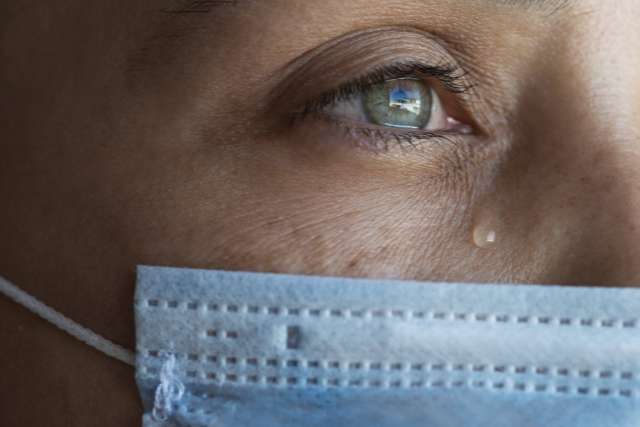It’s not just the nearly 530,000 COVID-19 deaths in the United States and 2.6 million deaths around the world. The pandemic has caused millions of people to lose their jobs. Thousands have lost their homes. Millions of students have lost an irreplaceable year of school — whether second grade or senior year, it typically only comes once in a lifetime.
Weddings, birthday parties, holiday celebrations, even funerals have been canceled. Graduations and proms have been made virtual. There’s been loss of stability and predictability. Loss of human touch.
COVID-19 created an unprecedented year of loss that affected everyone.
“In the pandemic, there are folks that are on yachts, there are folks that are on boats, there are folks that are in canoes, there are folks that are on a raft and then there are people that are holding onto a log,” says Gina Kornfeind, MSW, support and bereavement coordinator for the Pediatric Pain and Palliative Care Program at UCLA Mattel Children’s Hospital.
But we are all adrift.
“I don’t think there has ever been loss on this scale before, because it’s not just the illness and mortality, but all the ripple effects, even psychologically, that are just so immense,” says psychiatrist Jena Lee, MD, director of pediatric emergency psychiatry at UCLA Mattel Children’s Hospital. “What’s so hard to cope with in this loss is that it’s not just a loss of jobs and a loss of school days — it’s a kind of very ambiguous sense of loss that continues to accumulate.”
As a population, we are struggling to cope. A recent study shows alcohol use among adults is up at least 14% since the pandemic began. The U.S. Centers for Disease Control and Prevention reports substance use and overdoses also have increased, as have experiences of anxiety and depression.
Rates of suicidal ideation and attempts among children and adolescents may have increased by as much as 50% from 2019, Dr. Lee says, affecting children as young as 10.
“Working in the Emergency Department, I will say it’s taken a particular toll on folks who are already vulnerable — those who already suffer with mental illness, those who already have very vulnerable family structures, families that have some conflict or have limited financial and even social support,” she says. “For those who are vulnerable, it’s been an unprecedented test that many of us are failing day to day.”

Compounding this bitter brume is the absence of the rituals and routines that give our lives meaning and structure.
Maybe listening to audiobooks or podcasts during the commute provided escapist bookends to the work or school day, only now there’s no commute, and maybe no work. The yoga class that offered a reliable way to stretch away stress at the end of the week isn’t the same respite on the laptop as it was in the incense-scented studio. Maybe it’s the book-club meeting where you could laugh and unwind and feel most like yourself that you miss, or the early-morning running club where you tapped into your inner athlete with other fleet-footed folks that’s been supplanted by solitary jogs through the neighborhood.
“Almost everyone's coping mechanisms are stifled — the things that we do to cope with our daily struggles, even if we don't realize consciously that they're coping mechanisms,” Dr. Lee says. “All of these activities we do give us a sense of identity in our relationships and daily lives.”
Group social events like these aren’t just about the yoga postures performed or the book being discussed or the miles logged.
“Our sense of identity, of feeling fulfilled and of self-worth are being cultivated in a lot of what we experience socially,” Dr. Lee says. “So without these activities, it's not just the social support that's lost, but it can feel so overwhelming — and it is —because it takes a toll on our sense of identity.”
Studies show that strong social connections have profound health impacts, including extended lifespan. “These group activities that we had before COVID, they really serve to help us feel like we matter,” Dr. Lee says. “I think it’s because they provide so much meaning to our lives, which is what sustains us.”
Human beings also tend to seek companionship and community when facing loss. And with regular updates about the number of cases and number of dead over the past year, not to mention the destabilizing shift in routines, reminders of loss are everywhere. Yet pandemic protocols prohibit gathering.

“We’re a pretty death-phobic society, but you can’t avoid thinking about it anymore when you see it on the news every day,” Kornfeind says. “I think everyone’s more in touch with mortality. Everyone is thinking how it could be me, it could be my mom, it could be my brother. When we have these powerful, deep feelings about mortality, what do we do? We get together and soothe each other. And when we can’t, it really affects people. It almost starts to have us go into an existential dilemma of: What is happening? How do I matter?”
To have such feelings affect nearly everyone in the country (or on the globe) at once generates a pervasive ennui that can feel like moving through chin-deep tar: even the simplest efforts are taxing, and it takes a lot of energy to find the light.
Acknowledging and experiencing these complex and challenging feelings is essential to getting through them, Kornfeind says: “It’s uncomfortable, but we can learn to talk about uncomfortable things and help each other by just being in that boat together.”
Kornfeind has been conducting her grief groups online for nearly a year now. But mental-health resources have been stretched thin as demand has skyrocketed during the pandemic, Dr. Lee notes. She recommends starting with your primary-care provider or accessing the Los Angeles County help line at (800) 854-7771.
When it comes to coping with this year of loss, behavioral-health experts rely on the same behaviors they recommend to the rest of us. “I think it’s kind of soothing to know that all of us, no matter what our roles are or how much we're suffering, the prescription is always the same: really focusing on sleep, nutrition and exercise,” Dr. Lee says.
Sleep: “Sleep hygiene is so important,” Kornfeind says. “Having poor sleep can really bring about or compound depression and anxiety.”
Sleep can be easier to come by if you maintain a consistent bedtime, develop a nighttime routine (such as reading or stretching before bed) and tune out of electronic devices an hour or two before turning in.
Nutrition: Studies show that a balanced diet rich in plant foods positively affects mental health. Eating regular meals also stabilizes blood sugar, and by extension, mood.
Exercise: Regular movement is key to well-being and many studies have shown that exercise effectively boosts mood and can reduce depression. Dr. Lee says she does jumping jacks or holds a plank pose before Zoom calls to energize. Kornfeind has been spending time with the old elliptical machine in her garage.
“It’s so important to get your endorphins going, so exercise is a huge thing,” she says. “Just walking is huge. Having fresh air on our face and bodies along with possibly seeing neighbors or animals at a distance can help a great deal. It is the little things that can help us cope.”
Journaling and introspective practices: Both Kornfeind and Dr. Lee recommend journaling as a means of expression and reflection.
“I'm a huge fan of journaling,” Dr. Lee says. “There's actually evidence that journaling can really help physical health as well and be preventative in mental illness.”
Kornfeind suggests using a journal to purge uncomfortable emotions and to record goals and dreams for the future. Many studies have shown that practicing gratitude — recording a few things each day that you’re thankful for, for example — increases well-being.
“If we don't practice these things with intention and create space for them, it's too easy to, just by default, get overwhelmed with what the media shows us — the losses and the numbers — and our stress day-to-day,” Dr. Lee says. “But we can learn to take deliberate time to think about things that we're grateful for and ways in which we can create meaning.”
Connection: “Finding your people is so important,” Kornfeind says. “Finding people who are good listeners, who are able to be there for you, who can really hear you.” People who will commiserate with you and offer perspective. Zoom gatherings aren’t as much fun as in-person get-togethers, but they offer a much-needed means of connecting with others.
For more resources to help cope with pandemic losses, visit:
Related articles:
COVID-19: Track the latest developments and look back at how the pandemic evolved
What to expect from the second dose of the coronavirus vaccine




